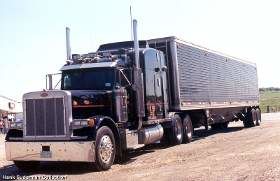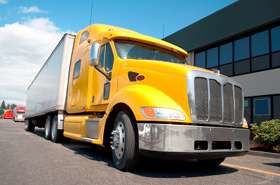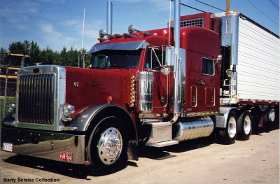Does The Sleeping Team Driver Have To Get Up To Work?
Topic 12978 | Page 1

Daniel D asks:
The question is: when the truck pulls into one of the three stops on the run, does the driver presently in the sleeper have to get up to help unload, or otherwise work? On the one hand, it's reasonable to expect that the two drivers help each other, especially when it's needed the most; on the other hand, each driver needs his rest. I asked the company this question, and got vague answers. How would a situation like this work in the real world? Thanks in advance for your answers.
If the co-driver is in the sleeper taking their 10-hour break, then definitely no, they should remain in the sleeper for at least 8 consecutive hours. Unless you are working for a company that requires the driver to unload or load, it's really a non-issue.
By definition, team driving is; while one driver is "driving" and/or "on-duty", the other driver sleeps. Adequate rest is arguably one of the most important aspects of truck driving. Using your "sleep" time for anything else, is a potential safety risk not worth taking.

My goodness I have been in this sticky wicket myself. The answer is no, but by no means is it a way make friends. My co driver and I help each other on unloading when it's necessary. If it's a light drop we usually do it ourselves rather then wake the other person. Set the ground rules first with your co driver that way no ones dissatisfied.

When I as team driving. We would help each other out in tight backs, and areas that we needed 2 says eyes. But other wise the person sleeping was left sleeping.

Daniel D asks:
The question is: when the truck pulls into one of the three stops on the run, does the driver presently in the sleeper have to get up to help unload, or otherwise work? On the one hand, it's reasonable to expect that the two drivers help each other, especially when it's needed the most; on the other hand, each driver needs his rest. I asked the company this question, and got vague answers. How would a situation like this work in the real world? Thanks in advance for your answers.
If the co-driver is in the sleeper taking their 10-hour break, then definitely no, they should remain in the sleeper for at least 8 consecutive hours. Unless you are working for a company that requires the driver to unload or load, it's really a non-issue.
By definition, team driving is; while one driver is "driving" and/or "on-duty", the other driver sleeps. Adequate rest is arguably one of the most important aspects of truck driving. Using your "sleep" time for anything else, is a potential safety risk not worth taking.
Daniel, I re-read your post. I am guessing this is like a McLean or Dollar General type of dedicated account?
My only caution is that one of you will need to have enough available driving hours to make it back to your terminal. HOS rules are such that you can be on-duty indefinitely, but you will be limiting your available driving hours until completing the 10 hour break. For example let's say that for every one of the three stops, the resting driver helps the logged-in/on-duty driver each time. Each time the sleep break is interrupted, it will need to be restarted from zero until the full consecutive 10 hours is reached. At some point the one driver will not have enough hours to continue driving, and the co-driver will need to take over. If the co-driver was legally going back on-duty to help out at each of the three stops, neither one of you will have enough driving hours to complete the run.
It's tricky in this situation. Are they expecting you to run illegal, meaning remain off-duty and help out the on-duty driver?
Terminal:
A facility where trucking companies operate out of, or their "home base" if you will. A lot of major companies have multiple terminals around the country which usually consist of the main office building, a drop lot for trailers, and sometimes a repair shop and wash facilities.
HOS:
Hours Of Service
HOS refers to the logbook hours of service regulations.
Thank you, everyone, for pitching in here.
G-Town: you are correct that this is like a Dollar General account.
One of the answers I got was from the recruiter, who said the situation would be "played by ear" rather than by hard-and-fast rules. Which causes me to believe that they would want the sleeping driver to wake up and work, yet be logged in as sleeper berth. not good at all.
Thanks again.
Sleeper Berth:
The portion of the tractor behind the seats which acts as the "living space" for the driver. It generally contains a bed (or bunk beds), cabinets, lights, temperature control knobs, and 12 volt plugs for power.

Running like that would be a nightmare if you had to break your sleep to unload, which it sounds like they are insinuating with "play it by ear."
When I was in training at Prime we ran a flower load with something like 10 stops that we unloaded by hand, and we both unloaded at the stops. You get all hot and sweaty and then can't go back to sleep, then all of a sudden it's your turn to drive.
It was by far the most tired I've driven a truck, and I am someone that could pull off a 48 hour drive (not that I do).
I'm not sure how Prime expects teams to unload flowers, but that is how we did it. I told my fleet manager that I'm allergic to flowers now that I'm running with my wife.
Fleet Manager:
Dispatcher, Fleet Manager, Driver Manager
The primary person a driver communicates with at his/her company. A dispatcher can play many roles, depending on the company's structure. Dispatchers may assign freight, file requests for home time, relay messages between the driver and management, inform customer service of any delays, change appointment times, and report information to the load planners.New Reply:
New! Check out our help videos for a better understanding of our forum features

















Preview:








 TT On Facebook
TT On Facebook
Hi folks,
I have been looking into doing an overnight team dedicated run that would have me close to home daily (the starting and ending point is across town from me), and off weekends. (There wouldn't be daily home time, as the run would take close to 24 hours to complete).
The question is: when the truck pulls into one of the three stops on the run, does the driver presently in the sleeper have to get up to help unload, or otherwise work? On the one hand, it's reasonable to expect that the two drivers help each other, especially when it's needed the most; on the other hand, each driver needs his rest. I asked the company this question, and got vague answers. How would a situation like this work in the real world? Thanks in advance for your answers.
Dedicated Run:
A driver or carrier who transports cargo between regular, prescribed routes. Normally it means a driver will be dedicated to working for one particular customer like Walmart or Home Depot and they will only haul freight for that customer. You'll often hear drivers say something like, "I'm on the Walmart dedicated account."